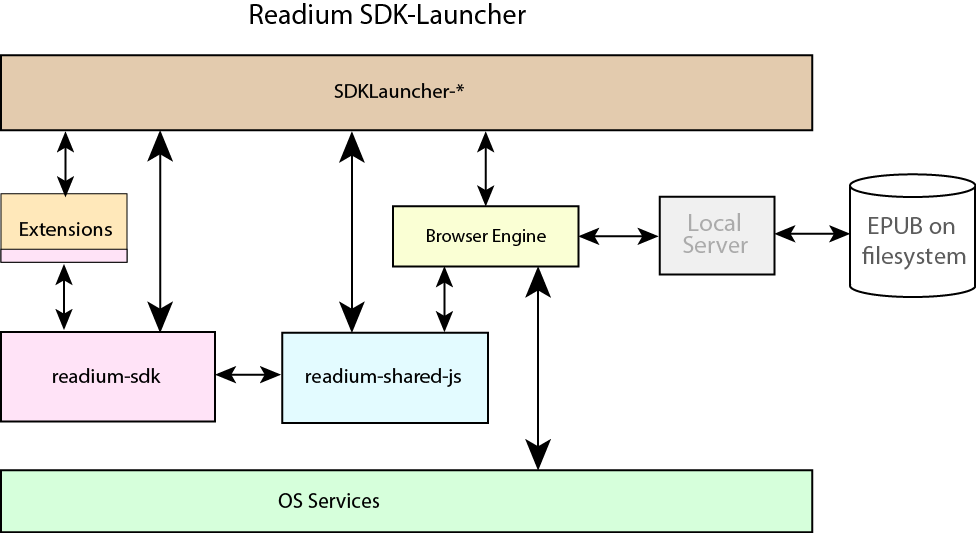
Understanding Readium – Features, Architecture and Alternatives
Summarize this blog with your favorite AI:
What is Readium?
The Readium Foundation was created in March 2013 as an independent non-profit corporation. The Open Source Foundation aims to develop technology for expediting the adoption of ePUB3 and the Open Web Platform by the Digital Publishing Industry. It strives to deliver leading-edge functionality that is fully specified, free, open, and interoperable.
Readium aims at networking and coordinating between other similar open-source efforts. Among them, the European Digital Reading Lab (EDRLab) is the most important participant of the Readium project. In addition, EDRLab is also the driving force behind the LCP (Licensed Content Protection) system, which is a significant new development of Readium.
The Readium project aims to develop a robust, high-performance, cross-platform, and standards-compliant ePUB reading system, which can be used by the native applications of both mobiles, tablets as well as desktop systems. This engine can be deployed in browsers and embedded into browser apps such as Google Chrome extension or into native applications.
Readium SDK is a software development kit (SDK) that provides developers with the tools and resources to create EPUB 3-compliant reading systems for digital content. The Readium SDK performs simplistic test applications for the different operating systems, whether it be Android, iOS, or even OS X, apart from supporting encryption-based modules. Although it can work along with various web browsers, the Readium SDK prioritizes the development of the WebKit over everything else.
Related Read: How to Choose the Best SDK for your Custom eBook Platform
What are the Goals of a Readium Project?
The Readium project’s primary goals were to:
- Facilitate the rapid implementation of ePUB3, without depending on or proliferating proprietary technologies.
- Provide functional and innovative ePUB reading systems for web use. At present, two systems are available: ReadiumCloudReader and Readium Chrome Extension. ReadiumCloudReader is a cross-browser solution for embedding in the websites of users, whereas Readium Chrome Extension is available for download in the Google Chrome Store.
- Create a cross-platform native code software development kit (SDK), which you can use to build native applications across different hardware platforms.
- Create a platform, which is able to support a variety of digital publishing formats such as ePUB 2.x and 3.x, audiobooks, Web Pub, and image-based books such as Manga.
How-To Guide:
How to Automate PDF to ePub3 Conversion
8 Features of Readium
The wide popularity of Readium is mainly due to some of the integral qualities of this ePUB reader. Following are some of the general features of Readium:
- Accessibility – Readium is available for both open source as well as proprietary applications.
- Portability– Readium can be ported or deployed to a wide variety of platforms, including desktop and mobile devices, browsers, and native applications. Its target platforms are iOS, Android, Browser-based, and Desktop.
- Communication– Readium actively tries to create a courteous, welcoming and approachable environment for newcomers in the field. Readium makes use of public chat rooms and a public mailing list to communicate and discuss with its contributors. Through these channels, Readium gives equal value to the ideas of both new as well as existing contributors.
- Standards Compliance – Readium makes use of regression testing to ensure strict compliance and compatibility with the latest ePUB3 specifications. Moreover, it also provides feedback to the IDPF ePUB standards community and the broader W3C and web standards community by introducing the latest technologies and ensuring that the new standards can be implemented in their engine. Readium is not only compliant with all the applicable W3C specifications and with ePUB, but also with most of the other emerging digital publishing formats such as audio and comic books.
- Compatibility – Along with ensuring its compatibility with the ePUB specifications, Readium also makes sure to comply with the latest emerging standards such as that of WebPub. Readium ensures that their compatibility with the ePUB reading systems does not come at the cost of standards compliance.
- Stability – Readium maintains the highest degree of stability possible through a careful release process that closely monitors the issues reported by internal testing and external forums. It prioritizes instant fixes and releases for crashes, hangs, and regressions.
- Performance – Readium constantly strives to improve its speed and memory efficiency.
- Security – Readium strives to protect its users from security violations and threats by instant fixes of security issues.
Architecture of Readium
The relationship between the parts of the architecture of Readium is illustrated in the diagram below:
- Readium-sdk
This is the platform-independent Core C++ code that manages the ePUB package, metadata, and various functions such as the navigation and fetching of resources.
- Readium-shared-js
A layer of pure JavaScript, it offers interfaces and services between the application layer, the Core and the web-browser engine. You can use it across both the ReadiumJS sub-projects and SDK-based applications.
In addition to managing the messaging between the native layers, the layer also provides better management of views.
- SDKLauncher
These platform-specific applications facilitate the testing of the rest of the SDK and provide a rudimentary demonstration of how to integrate the native applications within the SDK. They are made deliberately limited and crude, as Readium does not want to compete with its own members.
The Next Step
Despite popular belief, Readium remains active and thriving, having transitioned from legacy toolkits to modern platforms like Readium Mobile, Desktop, and Web. Alternatively, people can also experiment with other SDKs to ensure continuous and seamless user experience. KITABOO SDK allows you to integrate high-quality rendering, annotation, and analytics to the bespoke eBook platform. It is designed for publishers to create and deliver eBooks. Kitaboo eBook platform and Kitaboo SDK find favor with many leading publishers. The Kitaboo SDK framework can be integrated on any platform – Android, iOS, Windows and HTML. It lets you customize and integrate all its functionalities into your system of choice, helping you create a robust ePUB reading system for mobile and desktop devices.
If you want to leverage Kitaboo SDK to create a robust reader, please get in touch with us.
Suggested Reads:
- How to Select the Best eBook Publishing Platform
- Best Practices in Publishing & Distributing eBooks at Scale
- How to Select the Best Digital Publishing Platform
- 8 Highly Effective Digital Publishing Strategies
- 6 Reasons You Should Go For ePUB over PDF
- Video Training Content
- K12 Publishers
- Associations & Societies
- Trade Publishers
- Training Companies
- Content Aggregators
Discover how a mobile-first training platform can help your organization.
KITABOO is a cloud-based platform to create, deliver & track mobile-first interactive training content.




